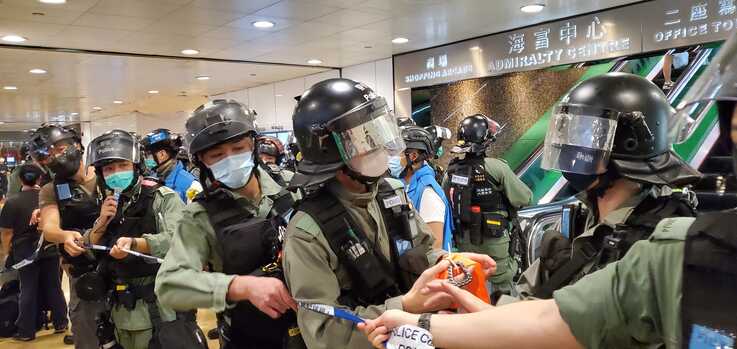Hong Kong police arrested more than 300 people on Wednesday after tens of thousands of people protested the adoption of a controversial national security law that is poised to pass in Beijing on Thursday and a proposed law criminalizing the disrespect of China’s national anthem.
Thousands of riot police officers fired pepper balls to disperse protesters across several districts in Hong Kong. Police stopped and searched mostly young people outside subway stations and on the streets throughout the day. A police statement said people were arrested for offenses including the possession of offensive weapons and unlawful assembly.
Crowds of people who gathered in Admiralty, the area where the legislative council and government quarters are located, were dispersed by police who threatened them with pepper spray if they did not comply. There were police officers guarding every street corner in the area to prevent people from getting near the government buildings. Walkways leading to the government buildings were cordoned off. Police quickly closed in on small groups of activists who gathered to chant slogans and give speeches expressing their opposition to the national anthem bill. At one point, police ordered people in nearby restaurants to leave.
WATCH: Street view of Hong Kong protesters
At lunch time, hundreds of office workers turned out on the streets in Central, the heart of Hong Kong’s business district, at a rally. Crowds chanted slogans, including “Fight for Freedom, Stand with Hong Kong,” “Hong Kong independence, the only way” alternately and shouted obscenities at the police. “Be a Hong Konger!” someone shouted towards the police, implying they were working for the interests of China, and not their own city. About half an hour into the rally, police fired pepper balls and people ran into nearby buildings.
“Not just this national security law, we see China continuously encroaching on our freedoms and we see police being whitewashed (in a report clearing them of wrongdoing),” said a lawyer who declined to give his name. “If we keep quiet, they can get away with it.”
A police statement said protesters blocked roads with bins and traffic cones and threw objects at officers. It said police had “no other choice but to employ minimal force” by firing pepper balls to stop the “violent behavior.” The interruption was however brief as traffic continued to move slowly.
Hundreds of people also defied the heavy police presence to gather on the streets of Causeway and Mongkok, both busy shopping districts. Many young people were stopped and searched by riot police. Young people, including some in high school uniforms, were made to line up against the wall outside a shopping center in Mongkok. Police accused protesters of blocking traffic and placing obstacles on the streets.
Hong Kong police said on Facebook that some people in Mongkok set cardboard and other objects on fires around 9 p.m. local time but the first was quickly put out.

Protesters said they were fueled by anger at what they perceive as China’s intensifying encroachments into the semi-autonomous city, including foisting patriotism upon Hong Kongers through a law that forbids mockery of the national anthem. They also expressed helplessness as China’s National People’s Congress prepared to pass national security laws, bypassing Hong Kong’s legislature on Thursday.
“I know we have no power to fight against China, but I must come out to show my opposition to it. I’m not afraid even if they jail me,” said a 71-year-old man surnamed Chow, who used to be a staunch supporter of the Communist party until the crackdown on the Tiananmen pro-democracy movement.
Inside the chamber of the Legislative Council, lawmakers made speeches to express their stance on the national anthem bill, which is expected to pass on June 4, the anniversary of the 1989 Tiananmen crackdown. Pro-Democracy lawmakers expressed their exasperation over a bill that is poised to pass because the legislature is dominated by pro-Beijing lawmakers – only half the seats are popularly elected by ordinary voters while the rest are chosen by largely pro-Beijing “functional constituencies.”
Lawmaker Dr. Kwok Ka-Ki told the legislature that rulers should follow the teaching of ancient Chinese philosopher Mencius, who said rulers should “love their people as if they were his children.”
“There is no need to use rubber bullets and tear gas to suppress people and to make people become subservient to your rule… and when they are already feeling emotional you suppress them with the security law to subjugate them under truncheons and guns,” Kwok said.
China last week revealed its plan to bypass Hong Kong’s legislature to impose a national security law on Hong Kong to prevent and punish acts of “secession, subversion or terrorism activities” that threaten national security.
The move, which would also allow Chinese national security organs to set up agencies in Hong Kong, has received wide international criticism, with the United States threatening consequences for China.
Source: VOA












